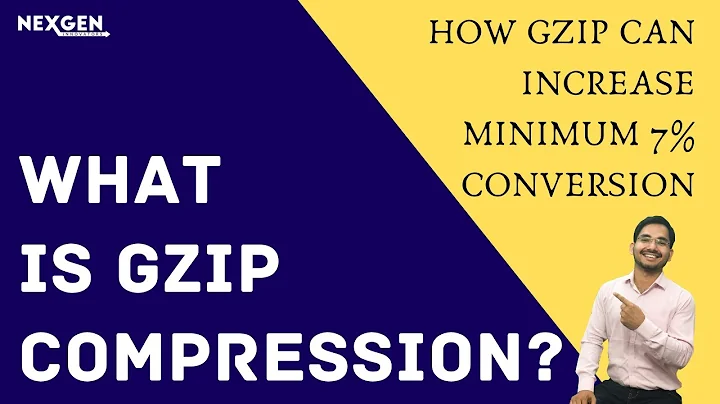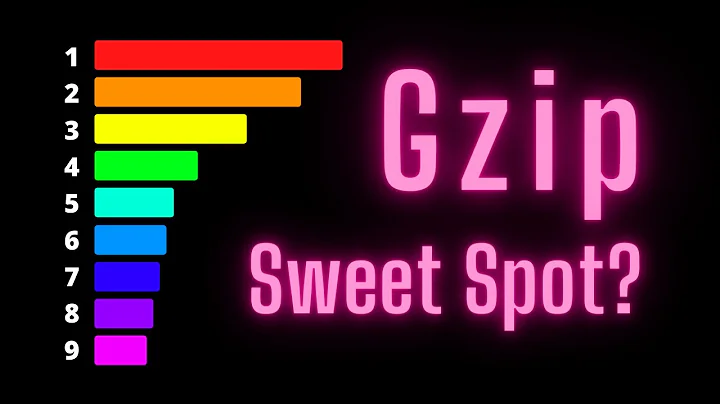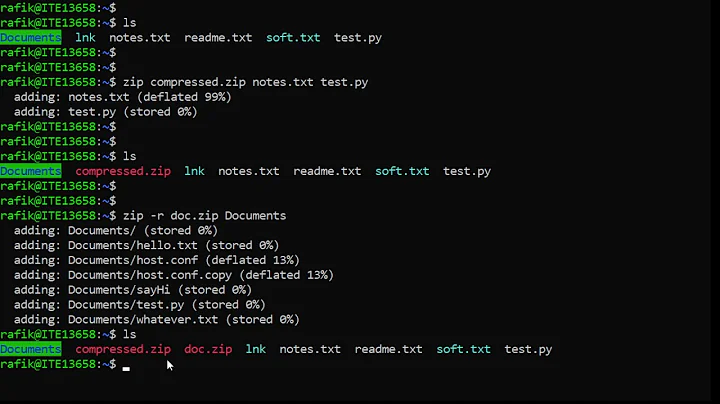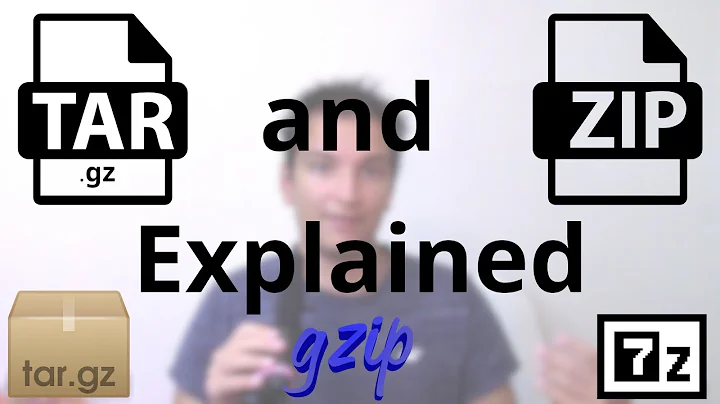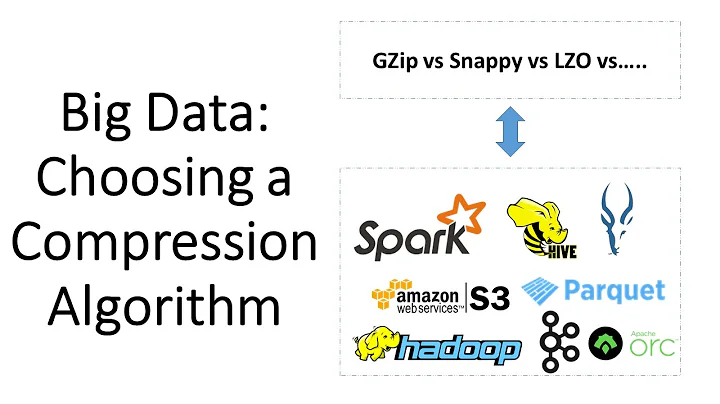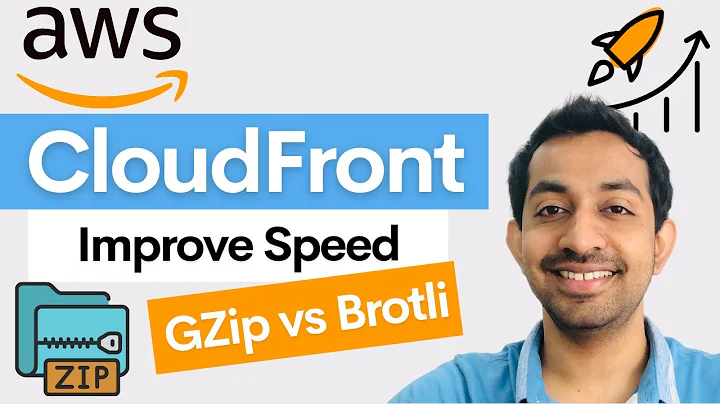What is the advantage of GZIP vs DEFLATE compression?
Solution 1
Gzip is the more reliable because it is deflate plus a few headers and a check sum. In other words gzip is deflate, and extra headers and check sum. Deflate is checked with adler32, which is also part of gzip. Because the gzip payload is a DEFLATE-compressed payload.
a gzip file/stream contains:
- a 10-byte header, containing a magic number, a version number and a time stamp - optional extra headers, such as the original file name, - a body, containing a DEFLATE-compressed payload - an 8-byte footer, containing a CRC-32 checksum and the length of the original uncompressed data
Solution 2
The other answer is mostly wrong. The "deflate" value for the Content-Encoding HTTP header is a misnomer that actually means ZLIB. Given that, both have checksums and the same compressed content. They only differ in their headers/footer and which checksum they use.
| gzip | "deflate" (zlib) | |
|---|---|---|
| Header size | 10 bytes | 2 bytes |
| Footer size | 4 bytes | 0 |
| Checksum | CRC32 | Adler-32 |
| Compression algorithm | DEFLATE | DEFLATE |
| Specification | RFC1952 | RFC1950 |
Historically, "deflate" was problematic because early Microsoft IIS servers would send raw deflate data instead of zlib data (see https://stackoverflow.com/a/9186091/1218408). To work around that, it became common to just use gzip.
Deflate is very slightly faster because Adler-32 is typically faster to compute than CRC32, but the majority of the time is spent actually compressing data and not calculating the checksum.
Related videos on Youtube
GibboK
A professional and enthusiastic Senior Front End Developer. Listed as top 2 users by reputation in Czech Republic on Stack Overflow. Latest open source projects Animatelo - Porting to JavaScript Web Animations API of Animate.css (430+ stars on GitHub) Industrial UI - Simple, modular UI Components for Shop Floor Applications Frontend Boilerplate - An opinionated boilerplate which helps you build fast, robust, and adaptable single-page application in React Keyframes Tool - Command line tool which convert CSS Animations to JavaScript objects gibbok.coding📧gmail.com
Updated on December 03, 2021Comments
-
 GibboK over 2 years
GibboK over 2 yearsI have a web site in asp.NET 4 (C#).
I’m trying to find a way to better optimize bandwidth for my website.
I read many articles saying that DEFLATE is faster and smaller that GZIP because GZIP (based on DEFLATE) adds some extra data.
Checking the headers of bing.com and google.com it seems that they both send GZIP-encoded data.
Assuming what I read is true, I miss the advantage of GZIP in this case. So I suspect there should be a good reason to prefer GZIP to DEFLATE.
My questions:
- Does GZIP offer any advantage over DEFLATE I'm not aware of?
- Any clue why major search engines use GZIP?
Here’s the code I’m using to send DEFLATE (from Global.asax):
protected void Application_PreRequestHandlerExecute(object sender, EventArgs e) { HttpApplication app = sender as HttpApplication; string acceptEncoding = app.Request.Headers["Accept-Encoding"]; Stream prevUncompressedStream = app.Response.Filter; if (!(app.Context.CurrentHandler is Page || app.Context.CurrentHandler.GetType().Name == "SyncSessionlessHandler") || app.Request["HTTP_X_MICROSOFTAJAX"] != null) return; if (acceptEncoding == null || acceptEncoding.Length == 0) return; acceptEncoding = acceptEncoding.ToLower(); if (acceptEncoding.Contains("deflate") || acceptEncoding == "*") { // defalte app.Response.Filter = new DeflateStream(prevUncompressedStream, CompressionMode.Compress); app.Response.AppendHeader("Content-Encoding", "deflate"); } else if (acceptEncoding.Contains("gzip")) { // gzip app.Response.Filter = new GZipStream(prevUncompressedStream, CompressionMode.Compress); app.Response.AppendHeader("Content-Encoding", "gzip"); } }-
Sebastian Paaske Tørholm over 12 years
-
 GibboK over 12 yearsThanks Paul for your revision.
GibboK over 12 yearsThanks Paul for your revision. -
Pacerier almost 12 yearsAll answers are wrong / incomplete, except this: stackoverflow.com/a/9856879/632951
-
 GibboK over 12 yearsTo summarise.. do you mean GZIP is more browser compatible?
GibboK over 12 yearsTo summarise.. do you mean GZIP is more browser compatible? -
Peter over 12 yearsGZip will enable the browser to check for errors, deflate won't
-
Pacerier almost 12 years@peer This is wrong, deflate will check for errors using adler32.
-
Peter almost 11 years@Pacerier you are right the DEFLATE payload is checked by a checksum.
-
 david_adler over 2 yearsdon't you mean adler-32 is slight faster than crc32?
david_adler over 2 yearsdon't you mean adler-32 is slight faster than crc32? -
Phil P over 2 yearsI think that you've confused DEFLATE for ZLIB. ZLIB is RFC1950, your reference, and mostly matches your description. DEFLATE is RFC1951.
-
 ZachB over 2 years@PhilP I didn't. I used the word "deflate" because that's the ill-named value of the
ZachB over 2 years@PhilP I didn't. I used the word "deflate" because that's the ill-named value of theContent-Encodingheader in the HTTP spec. You're right that it's actually ZLIB, and therein lies the problem I discussed with Microsoft IIS servers. I edited the answer to emphasize this.
